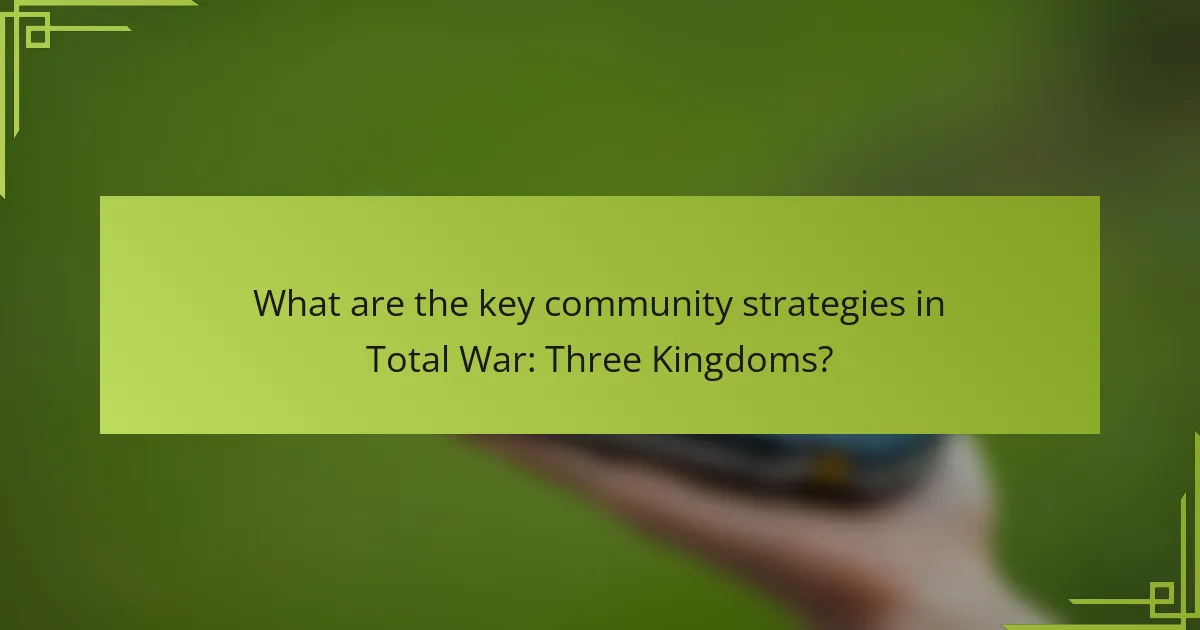Mastering Total War: Three Kingdoms requires effective community strategies and resource management techniques. Explore the benefits of alliances and trade agreements, the importance of diplomacy, and unique regional challenges. Discover innovative community-driven strategies that enhance gameplay and optimize resource allocation for sustained success. Engage with insights from forums to improve your overall experience in this complex strategy game.

What are the key community strategies in Total War: Three Kingdoms?
Total War: Three Kingdoms employs key community strategies focused on collaboration and resource management. Players benefit from forming alliances, sharing resources, and coordinating military efforts.
One effective strategy involves establishing trade agreements, enhancing resource acquisition. Another is creating military coalitions, allowing for shared strength against common enemies. Players can also engage in diplomacy, negotiating peace treaties to stabilize regions.
Community forums and guides provide insights on optimizing these strategies, helping players improve their gameplay. Engaging with the community fosters a deeper understanding of effective tactics and resource management practices.
How do players collaborate for resource management?
Players collaborate for resource management by forming alliances, sharing information, and coordinating strategies. This teamwork enhances efficiency in resource allocation and defense against opponents. Players often exchange resources based on their unique strengths, such as food production or military supplies. Effective communication ensures that all members benefit from shared resources, leading to stronger collective positions in the game. Additionally, players may engage in trade agreements to optimize their resource pools, balancing immediate needs with long-term goals.
What role do alliances play in community strategies?
Alliances enhance community strategies by fostering cooperation and resource sharing. They enable players to pool resources, strategize collectively, and strengthen defenses against common threats. This collaborative approach can lead to increased stability and success in managing territories. Alliances also facilitate knowledge sharing, allowing players to learn from each other’s experiences and strategies, which can be crucial for long-term growth and adaptation in the game.
How can players leverage forums and social media for strategy sharing?
Players can leverage forums and social media to share strategies by engaging with community discussions and exchanging insights. These platforms enable players to access diverse tactics and resource management techniques. Participating in discussions on dedicated Total War forums or social media groups fosters collaboration and idea sharing. Players can post their challenges and receive tailored advice from experienced members. Additionally, following content creators or streamers can provide fresh perspectives and innovative strategies that enhance gameplay. Engaging with the community enriches the gaming experience and contributes to personal growth within the game.
What are the most effective communication methods among players?
Effective communication methods among players in Total War: Three Kingdoms include chat features, voice communication, and forums. These methods foster collaboration, strategy sharing, and community building.
Chat features allow real-time messaging, enhancing coordination during gameplay. Voice communication provides instant feedback and clearer instructions. Forums serve as platforms for detailed discussions, strategy guides, and resource sharing.
Utilizing these methods can significantly improve team dynamics and overall gameplay experience. Players benefit from sharing insights on resource management and community strategies, leading to more effective game strategies.

Which resource management techniques are most successful in the game?
Resource management techniques that excel in Total War: Three Kingdoms include effective diplomacy, strategic trade agreements, and efficient army maintenance. Prioritizing food production ensures sustainability, while managing public order prevents rebellions. Utilizing spies and scouts enhances intelligence on enemy movements. Focusing on technology advancements boosts resource acquisition.
How do players prioritize resource allocation?
Players prioritize resource allocation by assessing immediate needs, strategic goals, and long-term sustainability. First, they evaluate their military requirements, focusing on troop training and maintenance. Second, they allocate resources to infrastructure, enhancing economic growth and stability. Third, players invest in diplomacy, fostering alliances and trade agreements to secure additional resources. Finally, they consider research and technology upgrades to improve efficiency and unlock new capabilities. Balancing these priorities ensures a well-rounded approach to resource management in Total War: Three Kingdoms.
What strategies exist for maximizing food production?
Maximizing food production in Total War: Three Kingdoms requires strategic resource management and community engagement. Focus on improving agricultural technology, optimizing resource allocation, and enhancing trade relations.
Invest in farming innovations to increase yields. For example, developing irrigation systems can significantly boost crop output. Foster alliances with other factions to secure trade routes, ensuring a steady supply of food resources.
Regularly assess your territory for resource availability. Prioritize regions with fertile land and abundant resources. Implement policies that encourage population growth, as a larger populace can contribute to increased agricultural productivity.
Monitor your food supply closely to avoid shortages. Utilize surplus food to strengthen your armies and improve community morale. This holistic approach ensures sustained growth and stability in your empire.
How do players manage military supplies effectively?
Players manage military supplies effectively by prioritizing resource allocation, maintaining supply lines, and utilizing trade agreements. Efficiently assigning troops to gather resources ensures a steady flow. Players should also monitor their supply consumption against military needs. Strategic planning and adaptability in response to changing battlefield conditions enhance overall supply management.
What are the best practices for trade and diplomacy in resource management?
Effective trade and diplomacy in resource management within “Total War: Three Kingdoms” hinge on strategic alliances and resource allocation. Prioritize building relationships with key factions to secure trade agreements.
Utilize diplomacy to negotiate favorable terms that enhance resource flow. Focus on balancing military needs with economic development. Effective resource management involves monitoring supply lines and adjusting strategies based on changing political landscapes.
Engage in regular assessments of resource availability and faction relations to adapt tactics. Leverage unique attributes of factions, such as their strengths and weaknesses, to maximize trade benefits.
Incorporate insights from community strategies to refine approaches. Successful resource management is a dynamic process that requires continuous evaluation and strategic foresight.

What unique challenges do players face in different regions?
Players in different regions face unique challenges in Total War: Three Kingdoms, including cultural differences, resource availability, and strategic preferences. For instance, players in Asia may prioritize diplomacy and trade due to regional alliances, while those in Europe might focus on military expansion. Additionally, varying internet speeds affect online play experiences, influencing competitive strategies. Resource management differs, with some regions having abundant food supplies, while others struggle with scarcity, impacting army sustainability. Understanding these regional dynamics is essential for effective gameplay.
How do cultural differences influence gameplay strategies?
Cultural differences significantly shape gameplay strategies in Total War: Three Kingdoms. Players from various backgrounds prioritize distinct tactics based on their cultural norms and historical perspectives.
For example, Eastern players often emphasize diplomacy and alliances, reflecting their cultural values of harmony and cooperation. In contrast, Western players may adopt aggressive strategies, focusing on military conquest and expansion.
Resource management also varies; some cultures prioritize economic stability, while others invest heavily in military infrastructure. Understanding these cultural influences can enhance strategy development and community interactions.
In summary, recognizing cultural differences allows players to adapt their approaches, fostering richer gameplay experiences.
What are the specific resource management issues in competitive play?
Total War: Three Kingdoms faces specific resource management issues, including food scarcity, public order, and economic stability. Players must balance military expansion with resource sustainability to maintain their factions effectively. Food shortages can lead to troop desertions and declining morale. Public order issues arise from overextension and insufficient governance, impacting loyalty. Economic stability is threatened by war costs and ineffective taxation. Each of these factors requires strategic planning to ensure long-term success in competitive play.
How do local events affect community strategies?
Local events significantly enhance community strategies by fostering engagement and collaboration among players. In “Total War: Three Kingdoms,” players can leverage local events to gather resources, form alliances, and strengthen their territories. These events create opportunities for strategic planning and resource allocation, ultimately impacting overall gameplay success. Engaging in local events can result in unique rewards, such as exclusive units or bonuses, which are essential for advancing in the game. As a result, players who actively participate in community events often experience improved resource management and strategic advantages.

What rare strategies have emerged from community experimentation?
Community experimentation in Total War: Three Kingdoms has led to several rare strategies that enhance gameplay. Players have discovered unconventional resource management techniques, such as prioritizing trade agreements over military expansion to ensure steady income. Another strategy involves using diplomacy to isolate powerful factions, allowing smaller factions to thrive. Additionally, some players have experimented with unique army compositions, focusing on unconventional units to exploit enemy weaknesses. These strategies reflect a creative approach to the game’s mechanics, showcasing the depth of community-driven insights.
How do unconventional tactics impact resource management?
Unconventional tactics can enhance resource management by promoting creative strategies that maximize efficiency. In “Total War: Three Kingdoms,” players often leverage unconventional approaches, such as ambushes or unexpected alliances, to secure resources. These tactics can disrupt opponents’ plans, leading to resource advantages. Additionally, they encourage adaptive thinking, allowing players to respond effectively to dynamic battlefield conditions. Embracing these strategies can result in more robust resource management and overall success in the game.
What are some overlooked community strategies that yield high rewards?
Engaging with community strategies in Total War: Three Kingdoms can significantly enhance gameplay. Overlooked strategies include fostering alliances, sharing resources, and organizing cooperative campaigns.
Building alliances with other players can provide mutual benefits, such as shared intelligence and coordinated attacks. Resource sharing helps maintain a steady supply chain, ensuring that all players have access to necessary materials. Organizing cooperative campaigns allows players to tackle challenging objectives together, maximizing efficiency and rewards.
Utilizing these strategies can lead to improved resource management and stronger community ties, ultimately enhancing the overall gaming experience.
How can players innovate within existing frameworks?
Players can innovate within existing frameworks by utilizing creative strategies and resource management techniques. Focusing on unique faction strengths can lead to new gameplay dynamics. For example, players can combine diplomacy and military tactics to create unexpected alliances. Experimenting with modding tools allows for custom scenarios and gameplay adjustments. Additionally, sharing insights and strategies within the community fosters collaboration and enhances overall gameplay experiences.
What lessons can be learned from community failures?
Community failures in Total War: Three Kingdoms highlight the importance of strategic adaptation and resource allocation. Players can learn to prioritize communication, collaboration, and flexibility in tactics. Analyzing failed community strategies reveals that overextending resources often leads to downfall. Effective management requires understanding the balance between aggression and defense, ensuring sustainability in gameplay.

How can players optimize their gameplay experience?
Players can optimize their gameplay experience in Total War: Three Kingdoms by employing effective community strategies and resource management techniques. Focus on building strong alliances to enhance military support and trade opportunities. Allocate resources wisely, prioritizing food and income to sustain armies and settlements. Utilize character skills and traits to maximize efficiency in diplomacy and warfare. Engage in regular community discussions to share insights and adapt strategies based on collective experiences.
What are the common mistakes to avoid in resource management?
Common mistakes to avoid in resource management include misallocation of resources, neglecting to prioritize tasks, and failing to adapt to changing circumstances. These errors can hinder progress and lead to inefficiencies.
One major mistake is underestimating the importance of resource planning; without a clear strategy, teams often struggle to meet objectives. Additionally, ignoring data analysis can result in poor decision-making.
Another common issue is overcommitting resources to specific projects, which can lead to burnout and reduced productivity. It’s crucial to maintain a balanced approach to ensure all areas receive adequate support.
Lastly, poor communication among team members can exacerbate resource management challenges. Establishing clear channels for feedback and updates is essential for successful project execution.
How can players adapt strategies for different play styles?
Players can adapt strategies for different play styles by understanding their strengths and weaknesses. Emphasizing resource management is crucial for all styles. For aggressive players, focus on rapid expansion and military dominance. Defensive players should prioritize fortifications and economic stability. Balanced players can mix both approaches, leveraging versatile units. Players can also study opponent tendencies to exploit weaknesses. Adapting to play styles enhances overall effectiveness and enjoyment.
What expert tips can enhance community collaboration?
To enhance community collaboration in Total War: Three Kingdoms, focus on effective communication and resource sharing. Establish clear channels for discussion, such as forums or social media groups, to facilitate strategy exchange. Encourage players to share their experiences and tips, fostering a supportive environment. Organize collaborative events, like multiplayer campaigns, to strengthen bonds within the community. Utilize in-game tools to track shared resources and achievements, promoting collective goals that benefit all members.
How do updates and patches influence community strategies?
Updates and patches significantly enhance community strategies in Total War: Three Kingdoms by introducing gameplay balance and new features. Players adapt their resource management tactics based on these changes, leading to diverse strategies. For instance, a patch that alters unit stats may prompt players to rethink their army compositions. Additionally, updates often address community feedback, fostering a collaborative environment where strategies evolve collectively. This dynamic interaction between updates and community strategies creates a richer gameplay experience.